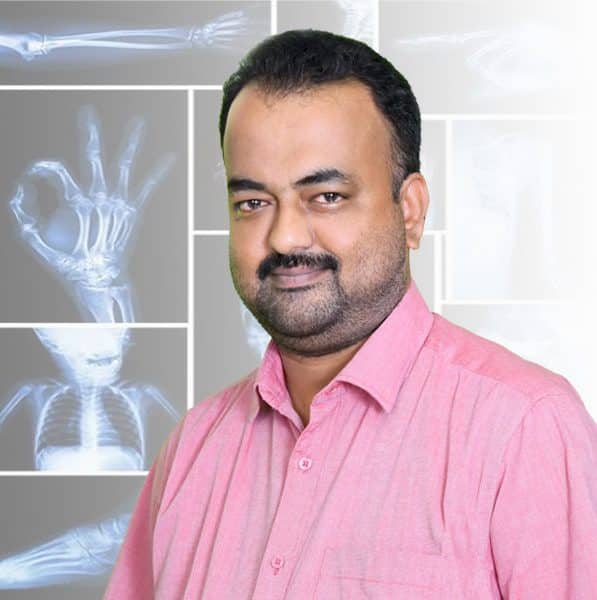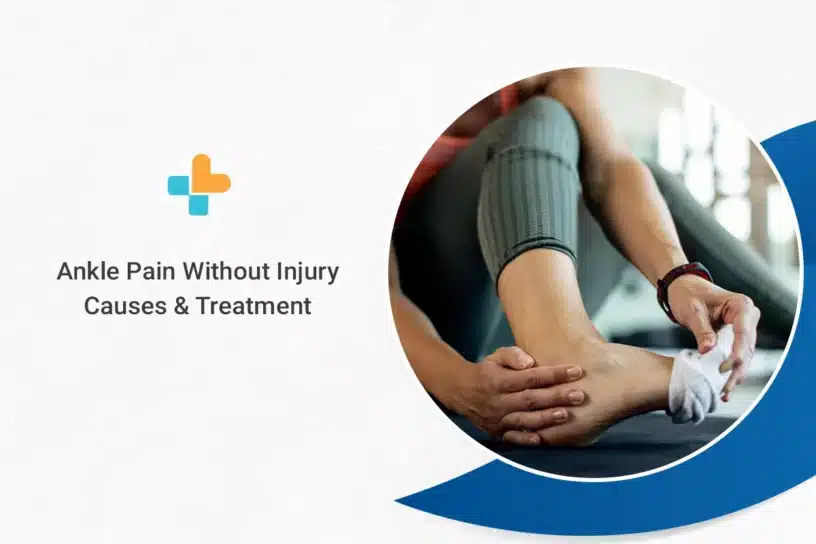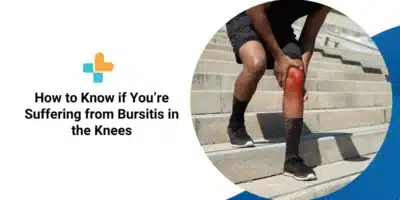Most people are familiar with ankle pain that results from sports or work-related injuries. Yet, fewer people are aware of non-injury-related ankle pain.
While it’s not fatal, ankle pain without injury can seriously diminish your quality of life. So understanding the causes is just as important as knowing the treatment.
In this blog, we’ll explore eight non-injury sources of ankle pain and how to treat them.
What Are the Possible Reasons for Non-Injury-Related Ankle Pain?
There are several possible reasons for non-injury-related ankle pain. Some are genetic, whereas others develop over time through infection or an unhealthy lifestyle.
Ankle Pain Without Injury: Causes and Treatments
Here are some of the causes of ankle pain that aren’t a result of injury and ways to treat them.
1. Bursitis
Bursitis is the inflammation of the bursae, a fluid-filled pad that cushions the joints. Often very painful, bursitis is a result of joint overuse and infections. It could also be associated with conditions like tendonitis, gout, arthritis, diabetes, and thyroid disease.
Symptoms include swelling, stiffness, and pain.
Treatment options include rest, ice, and taking pain relievers or anti-inflammatory medication. Surgery is usually rare.
2. Fallen Arches
Commonly referred to as flat feet, fallen arches is a condition where the entire sole of your feet touches the floor when standing. It can be a result of poor foot development during childhood, injuries, or ageing.
This condition is mostly free of symptoms, but some people with flat feet report experiencing pain in the heel or arch area. Treat options include arch-support insoles for shoes, stretching, or supportive footwear.
3. Gout
A gout is a form of arthritis that causes redness, inflammation, and severe pain in your joints. The pain and inflammation are the result of excessive uric acid deposit and crystallization in the joints.
Risk factors include the following:
- Overweight/obesity
- Diabetes
- Hypertension
- Poor diet (high in sugar, salt, and excessive animal proteins)
- Genetics
- Regular alcohol intake
- Blood cancer
Gouts can be acute or chronic. Anti-inflammatory medications relieve the former. To treat chronic gout, patients need to make lifestyle changes, such as exercising more often, making dietary changes, and reducing alcohol consumption alongside medication.
4. Infections
Ankle swelling and pain can be caused by several types of infection, including cellulitis. Staphylococcal infections can lead to bone infections called osteomyelitis, which results in the inflammation of the ankle bone and/or bone marrow.
5. Lupus
Lupus is a chronic autoimmune condition that causes inflammation of the skin, organs, and other body parts. It may cause joint pain and inflammation in the ankles, leading to arthritis, tendonitis, and tendon looseness.
Treatment options for ankle pain from lupus include nonsteroidal anti-inflammatory drugs, joint rest, and physical therapy.
6. Osteoarthritis
Osteoarthritis is a type of arthritis that occurs when flexible tissue at the ends of bones wears down.
Treatment options include footwear modification, anti-inflammatory medication, and physiotherapy for better flexibility.
You can also opt for injections to lubricate the ankle joint or cortisone to reduce inflammation. But these options are only a temporary fix.
7. Reactive Arthritis
Reactive arthritis is a condition that results in redness and inflammation in various joints, especially the knees, feet, toes, hips and ankles. It tends to develop after an infection, particularly a sexually transmitted infection or food poisoning.
There’s no cure for reactive arthritis, but most people tend to get better after six months. You can control pain and stiffness with steroidal and non-steroidal medication.
8. Rheumatoid Arthritis
Rheumatoid arthritis (RA) is an autoimmune and inflammatory disease that affects your joints – usually many at once. RA affects your joint lining, causing painful swelling. Over time, this leads to bone erosion and deformity.
While there’s no cure for RA, physiotherapy and anti-rheumatic drugs (DMARDs) can slow down its progression.
When Should I See a Doctor for Ankle Pain?
You should see a doctor for ankle pain when the pain starts to affect your quality of life. If you get non-injury-related ankle pain out of nowhere or if any ankle pain you have doesn’t seem to get better, then it’s time to see a doctor.
FAQs
What Do You Do When Your Ankle Hurts Out of Nowhere?
You should see your local physician when your ankle hurts out of nowhere. The pain could be a result of an unhealthy lifestyle — something your doctor can help correct.
What Diseases Cause Ankle Pain?
Diseases like arthritis, osteoarthritis, lupus, gout, diabetes, and many others cause ankle pain.
Why Is My Ankle So Painful but Not Swelling?
Your ankle is painful but not swelling, mostly because you might be suffering from a high ankle sprain. These sprains are commonly a result of a twisting or rotational injury.
Does Ankle Pain Mean Heart Problems?
Yes, ankle pain could mean heart problems. When your heart doesn’t function normally, blood flow slows down and backs up in the veins in your legs. This causes fluid to build up in your leg tissues.
Can Ankle Pain Be Serious?
Yes, ankle pain can be serious, depending on what’s causing it. There are some cases of ankle pain that could be a result of heart-related problems, infections, and other diseases.
Also Read : Exercises to Bring Relief to Joint Pain
Get the Best Care for You Ankle Pain at Ayu Health
Ankle pain without injuries isn’t deadly in itself, but it could be a sign of debilitating health problems. So, we highly recommend seeing your local physician if you experience any ankle pain that gets progressively worse.
If you’d like to learn more about treating ankle pain or if you’re looking for expert care for current ankle pain, visit the Ayu Health website and book an appointment with one of our specialists today.
Our Hospital Locations
Orthopaedics Surgery Hospitals in Chandigarh | Orthopaedics Surgery Hospitals in Bangalore | Orthopaedics Surgery Hospitals in Jaipur | Orthopaedics Surgery Hospitals in NCR | Orthopaedics Surgery Hospitals in Hyderabad
Our Doctors
Orthopaedics Surgery Doctors in Chandigarh | Orthopaedics Surgery Doctors in Bangalore | Orthopaedics Surgery Doctors in Jaipur | Orthopaedics Surgery Doctors in NCR | Orthopaedics Surgery Doctors in Hyderabad
References:
https://www.ncbi.nlm.nih.gov/pmc/articles/PMC7452080/
https://www.webmd.com/lupus/managing-lupus-pain
https://www.ncbi.nlm.nih.gov/pmc/articles/PMC4096779/
About the Author

Dr. Manjunath Kumar K.
Dr. Manjunath Kumar K. is a renowned Orthopaedics currently practicing at Ayu Health, Bangalore.
He is an orthopedic surgeon currently practicing at Mallige Medical Center, Bangalore. A highly qualified doctor, he has completed his MBBS from Bangalore Medical College and MS in Orthopedics from KIMS, Hubli. further higher surgical training was from England, Birmingham. His post-graduate degree from the royal college of Edinburgh and the Royal College of Ireland. He also has vast experience in treating Unilateral Total Knee Replacement, Bilateral Total, Knee Replacement, Total Hip Replacement Surgery, and ACL Tear




